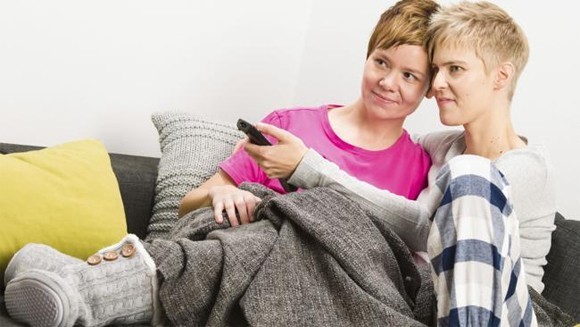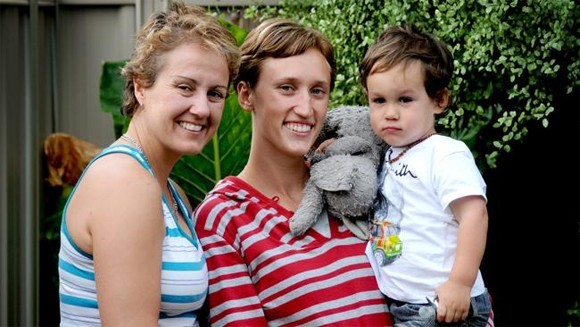- Plenty has changed in 30 years, says Mollard
- A generation raised without prejudice
- Kids know gay teachers, doctors, singers
- “Kids progressing faster than our politicians”
No one can make you feel inferior without your consent.
SUE and I met when we were 13. We had after-school jobs at Woolworths and bonded over our mutual inability to remember the “specials” and our mutual disgust at the deli coleslaw.
Before long, we were hanging out together most weekends.
I loved going to her house.
Sue lived with her mum, who was divorced, two big sisters, two dogs and a boarder called Christine.
They were vegetarian so we’d eat stuff like cashew nut roasts.
Growing up with two younger brothers, to me Sue’s sisters seemed so sophisticated. One was an artist and wore lots of black; the other was a riot of tie-dye.
But the situation wasn’t what it seemed: Christine was not the “boarder” but Sue’s mum’s lover.
Sue didn’t tell me for years, worrying that our friendship would suffer. She’d hoped I’d guess but I was clueless; naive; provincial.
When we were 16 she nervously told me in McDonald’s. I was a bit crap — confronted, awkward — the opposite of what she needed me to be. But “gay” wasn’t on my radar.
It was the mid 80s — I was yet to read Tales of the City, Boy George hadn’t officially come out and Philadelphia was still years away.
Sue’s mum and Christine were private about their relationship partly because they worked together, partly because they couldn’t be bothered with people’s reactions.
A spare room was set up as Christine’s bedroom to enable them to pass her off as the boarder.
Sue liked Christine living with them but was frustrated the “boarder” card was played to suit the adults rather than suit her.
She was upset, for instance, when they wouldn’t adopt the front when she needed to billet a hockey player from a visiting team.
As the decade unfolded I learned of more hidden lives: a swimming teammate being raised by his mum and “mum’s friend”; a flatmate agonising over how to come out to his conservative father; and Sue — despite setting out to be straight — realising that she, too, was gay.
With all of them there was tiptoeing: bosses who couldn’t be told, loves that couldn’t be acknowledged.
When my flatmate moved in with his boyfriend they had to rent a two-bedroom unit because landlords couldn’t countenance them sharing one.
Then there was AIDS, hovering like a huge inflatable wagging finger over their life choices.
That was nearly 30 years ago. Gratifyingly, much has changed. When our kids were six and three, two friends from England came to stay.
After a few days we left the house to them while we went on holiday.
“That’s lucky,” said our eldest, “now one of you can have my bed.”
We laughed, explained that Zoe and Lou loved each other and shared a bed just like any couple.
Their generation is being raised without prejudice.
They sing along to Same Love, as familiar with the tune as what the song means. And I can’t change, even if I tried, even if I wanted to.
They know teachers, doctors, singers who are gay; Ricky Martin; Ellen DeGeneres.
But as they trip from childhood into their teens what they can’t comprehend is how the country they live in continues to say “no” to marriage equality.
Ironically, it’s the impact on children that opponents to progress fear most even though kids — as in most things — are 10 steps ahead.
Kevin Rudd, recently announcing his support for gay marriage, admitted concerns about the welfare of children in gay relationships had been the stumbling block.
But the kids are all right. In fact, they’re thriving. The Australian Study of Child Health in Same-Sex Families last week revealed children of same-sex couples enjoy the same self-esteem, emotional behaviour and amount of time spent with parents as the rest of the population.
As for overall health and family cohesion they score higher than the national average.
According to the researcher, these families communicated issues like teasing or bullying which fostered openness and made the kids more resilient.
My friend Sue concurs. Whereas she recalls one of her friend’s mothers being rude and dismissive because she knew she had a gay parent, Sue says her son has never felt discriminated against for having two mothers.
She was always determined to be 100 per cent open about their relationship: “One boy at primary school kept asking him which of us was his real mother but our son was so secure in himself and his own sense of family that he genuinely thought the other boy was a bit thick for not ‘getting it’.
It reminded me of that Eleanor Roosevelt quote: ‘No one can make you feel inferior without your consent’.”
It’s ridiculous isn’t it? Our kids are progressing faster than our politicians.
They, along with the majority of their parents, see no obstacle to gay marriage.
Yet still our leaders dawdle.
I’m ashamed — for Sue’s sake, for her mum’s sake, for her son’s sake.
But I laugh when she follows up with an email: “You should point out that most gays are conceived and raised by straight parents and most gays have straight kids — you don’t want to fuel people’s fear that gay parents will lead to gay kids (and, worse, a simple eradication plan!)”
I’d like to tell her we’re better than that. Are we?
Author: Angela Mollard
Publication: news.com.au
Date: 13 June 2013


